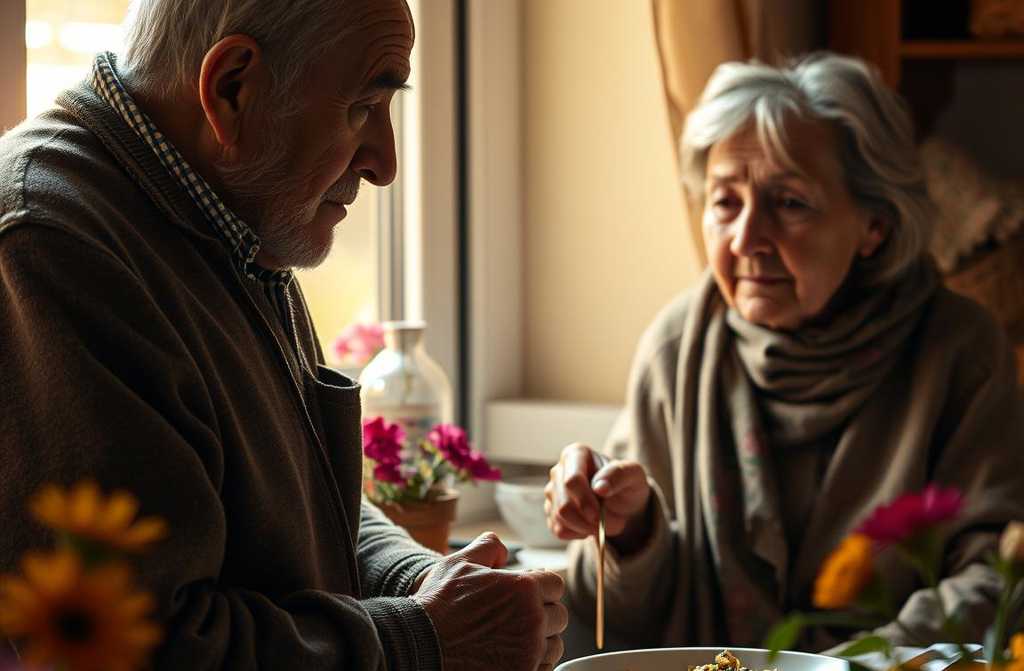Seven long years had passed since the earth took Lydias body. Seven years of silence that rang louder than any music in his ears, and loneliness that seeped into the walls of the house like the scent of woodsmoke. Steveneveryone called him Steviewas left alone at sixty-three. Not old, not young, stuck between two shores: behind him, a life full of love and storms; ahead, only the quiet, joyless drift toward an inevitable end.
God hadnt cursed him with illnesshis body, hardened by years of farm work, still held strength, but his soul was broken and empty. Lydia had faded slowly, painfully, and hed cared for her till her last breath, till the final tear on her worn cheek. And then she was gone, leaving him alone in the world. Theyd had no children, so theyd lived soul to soul in their own little universe, bound by the lanes of their village.
Hed grown used to Lydia being the sun of his small world. She was the warmth that heated the house, the light that filled it with comfort. Her hands made the best stews, baked pies with pastry so light it melted on the tongue. She ran the household: the dairy cow, the chickens, a calf fattened each year so theyd have their own meat in winter. The garden was her kingdom, ruled by perfect rows of carrots, onions, and potatoes. His work was the heavy labourploughing, digging, fixing what broke. He was the outer wall of their fortress; she was its heart.
A man gets used to anything. Stevie got used to the silence. At first, it pressed on him, rang in his ears, made him jump at every creak of the floorboards. Then it became background noise. Boring? Yes. Unbearably empty? Absolutely. But what could he do? That was fates will, and you couldnt fight it.
The local women, of course, had noticed him. Stevie was a fine-looking man, a hard worker, his house well-kept, and with no childrenin the village, that was almost like winning the lottery. They sent matchmakers, dropped hints themselves, some even outright offered to “start a family.” But he brushed them all off like bothersome flies.
“Im grieving my Lydie,” hed tell the neighbours, staring past their heads into nothing. “Shes watching from up there. Wouldnt approve of me bringing another woman into our home. Doesnt want her memory shadowed by a stranger.”
But in truth, in the quiet of his thoughts, he reasoned differently: “To live together, thered need to be a spark. A drop of affection. And there isnt. Maybe Im just not ready. My soul hasnt thawed yet.”
After his wifes death, he sold the cowwhat use was all that milk to one man? A good Guernsey, giving two pails a day. Sold her to a neighbour, his heart twisting as if hed betrayed another living creature tied to Lydia. But he kept raising a calf each summerfor meat. So he lived: his own meat, his eggs, milk from neighbourssometimes bought, sometimes given as charity by Annie next door, who watched him with silent pity.
Stevie had a limp. Years ago, a stubborn mare had broken his leg. The bone set crooked, but hed shrugged it offno time for fussing. The limp became part of him, and in recent years, a walking stick appearedoak, carved, a gift from Lydia. No one remarked on his unsteady gait anymore, as if it had always been that way.
That day, he sat at the kitchen table alone, ladling freshly made stew into a deep bowl. Summer heat hung thick, the air shimmering over the fields. The back door stood wide open, letting in lazy waves of scorching air. Suddenly, a shadow crossed the sunlit rectangle on the floor.
“Alright, Stevie! Just popped indoor was open!” boomed the voice of Tom, his neighbour two doors down, loud as a church bell. Tom was younger, full of restless energy and schemes Stevie couldnt fathom.
“Alright,” Stevie grunted. “Fancy some stew? Just off the stove. Chop some spring onions inwont regret it. Keep me company.”
“Dont mind if I do! Love your stew. Hot as it is, a proper meals always welcome. Well cool off after!”
Between mouthfuls, Tom eyed Stevie slyly.
“Listen, Stevie, you ought to remarry. No life for a manstuck at the stove alone. A womand cook your stew, make your bed, and well, you know.”
“You playing matchmaker now?” Stevie smirked. “Found me a bride, have you?”
“Whats wrong with that? How longs a widower supposed to mope? Youre pickycouldve had your pick of beauties by now!”
“A womans not just there,” Stevie said quietly but firmly. “Souls have to fit. To understand each other without words. One look, and you just know.”
“Oh, souls!” Tom waved a hand. “Youre past seventy! Who cares about souls? At your age, its about having someone nearbyto tend to you, bring you tea if need be. Think ahead!”
“Ahead?” Stevie put his spoon down, fixing Tom with a look. “You think Im some doddering old fool, ready to shack up with the first one who nods? No, Tom. Ill choose. And Ill live as I please.”
“Didnt mean it like that! No offence,” Tom backpedalled. “Just looking out for you! Thats why I brought it up. Got an aunt, seeAgatha. Next village over, Littlebrook. Firecracker of a woman! Not old, sharp as a tack. Keeps pigs, geese, a calf. Fine-looking, too. Names Agathaproper, eh? Visited her lately. Lively, full of life, and all alone. Fancy a trip? Meet her. Like hersorted. Bring her back. Eh?”
“Whats in a name?” Stevie sighed. “Sharing a roof, running a home. Modern women love themselves more than work. Would she dig a garden, tend livestock? They want pampering now, carrying on their backs. Im no young buck. And its odd, at my age, courting.”
“Oh, come off it! Ill go with you. Shes familywed be practically related! You know me, I know you. Cosy as you like!”
Back and forth, the talk dragged till evening. Wearied by the push and his own flicker of curiosity, Stevie gave in. Theyd go in two days, Saturday, in Toms battered old Land Rover.
When Tom left, Stevie sat in the hollow silence. The idea of remarrying, once abstract, now had weight. He scanned his home and saw it anew: dust on the windowsills cluttered with junkjars, nails, dried leaves Lydia once collected. The floor, long unscrubbed. A mountain of dishes in the sink.
Next dawn, he rose as if whipped by some inner urge. He wiped the sills, tossed the clutter. Scrubbed the floor, the fresh smell oddly lifting his spirits. Then the dishes. Found a long-unused detergent, squeezed out thick, lemony foam.
“Blimey,” he thought, watching plates gleam under the tap. “Moods better already. Do the mugs next. Been ages since I spruced up.”
Saturday morning, Tom honked outside. Stevie wore his only suitstill decent, if smelling of mothballs and yesterday. The road was long, potholed. They arrived by lunch.
Toms Land Rover halted by a leaning but sturdy fence. A woman stepped outpleasant-faced, early fifties, a good decade younger than Stevie. Her smile was broad, oddly rehearsed.
“Finally! Been waiting, dinners going cold! What took you?” she called before theyd reached her.
At that, something in Stevie chilled. It was clearhed been matchmade without his say. His hand twitched toward the door handle, ready to order Tom to turn back. But then he heard her whisper to her nephew:
“Hes crippled?” Her eyes flicked to his stick.
“No, Aunt Agatha, just broke his leg years back, walks a bit stiff. Nothing serious,” Stevie cut in, flushing.
She stepped closer, offering a hand. Her palm was unexpectedly warm, soft, as if untouched by labour.
“Welcome, dear. Im Agatha,” she said sweetly.
He shook awkwardly. “Afternoon. Steven. Or Stevie, if you like.”
Glancing round, he noted the tidy yard: neat rows, a whitewashed shed, not a weed in sight. “Hard worker,” he thought. “Proper homemaker.”
Inside was just as orderly. But the table stole his focusheaving with food: braised potatoes and pork, pickled cucumbers, tomatoes, a stack of golden pancakes beside a jug of cream, salted bacon, spring onions







